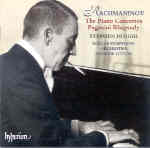This is the best set of Rachmaninov Piano Concertos ever recorded. You have no idea how hard I worked not to come to this conclusion, knowing full well just how skeptically such a claim is likely to be received. I compared Stephen Hough to multiple Ashkenazy renditions, to Earl Wild, to Zoltan Kocsis, to Argerich, Rubinstein, Richter, Rodriguez, and Horowitz. I ploughed through several obscure Russian recordings, two cycles on Naxos, and a slew of EMIs. I re-auditioned Pletnev and sampled two separate remasterings of Rachmaninov’s own performances. I listened with scores, then waited a few days, and then tried again without them. I played these discs to colleagues, to friends, and to people whose musical judgment I trust as much if not more than my own. But the conclusion was inescapable: there never has been a complete cycle at this level of consistent excellence. There’s no doubt about it.
In his personable and informative introduction to the set, pianist Stephen Hough asks the musical question, “Where were the flexible, fluent tempos, always pushing forward with ardour?” Well, if this is how you feel this music should sound, that’s exactly what you will find here, and much more besides. The allegros have the fleetness of Rachmaninov’s own performances (and Kocsis’), but Hough’s willingness to relax, his ability to linger over a phrase without ever breaking the long melodic curve, and Andrew Litton’s ability to shadow him with the manic determination of a celebrity stalker create an idiomatic give and take between soloist and orchestra that lies at the heart of all of this music.
The First Concerto has so much youthful fire that it begs comparison with the later masterpieces, while the performance of the Fourth is so cogent and knowing that Hough challenges Michelangeli for keyboard supremacy. The first movement packs the sort of punch we expect to hear in the Second Concerto, while the slender slow movement’s simplicity never triggers a suspicion of possible inadequacy. In the finale, Hough and Litton create a flurry of excitement, and it’s surely significant that the overall timing comes within seconds of Michelangeli, despite the greater flexibility of tempo and more probingly expressive approach.
The opening of the Second Concerto may come as a shock: strictly in tempo, exactly as the score dictates, Hough relates those first chords to the bell imitations in the First Suite for Two Pianos, not to mention the choral symphony The Bells. It’s so idiomatic and effective you can’t but wonder why so few pianists take the composer at his word. The entire first movement flows on like a river of melody, the moment of recapitulation perfectly timed and given just the right amount of additional weight. Hough’s improvisational sense of rubato in the slow movement never degenerates into meandering, and the finale has all of the Romantic lushness one might desire, alongside a brilliant virtuoso rush to the finish. Let’s also take a moment to acknowledge Litton and his outstanding orchestra. He recorded a fine Rachmaninov symphony cycle with the Royal Philharmonic for Virgin Classics, and it’s clear that his sympathy for the composer’s music runs deep.
No big concerto dies more easily in performance than Rachmaninov’s Third. Here, Hough shows his understanding that the soloist spends as much time accompanying the orchestra as leading it. He and Litton execute a series of beautifully judged accelerandos to keep the first movement surging forward. Hough chooses (correctly in my view) the revised cadenza, and he plays the living daylights out of it. The second movement lasts a bit less than 10 minutes–much more than that and it can begin to fall apart, though Argerich somehow brings it off. Note how subtly the playing underlines the thematic recollections of the first movement, and how effectively Litton prepares the thrilling launch of the finale. I can’t remember a time when the second subject has registered with such clarity and shapeliness, while the closing minutes practically define the word “thrilling”.
The four concertos were recorded live, before a very well-behaved audience (and much as I understand the audience’s noisy acclaim at the close of each work, I wish the applause had been omitted). The Paganini Rhapsody, which for my money gets its best performance on disc, is a “studio” effort, but no less exciting or spontaneous. Just listen to the interplay between solo and orchestra in the opening sequence of variations, to the way Hough and Litton deftly hand off melody and accompaniment, all the while underlining each variation’s motivic links to the main theme. You may think you’ve heard this piece to death: well think again. The Eighteenth Variation has passion that never turns excessively heavy, but the dark variation in triplets that precedes it is equally marvelous, as is Hough’s sense of timing in the wistful postlude. In the finale variations Hough actually finds melodies in dense thickets of notes, and it all culminates in a glissando so huge that you can almost visualize the piano keys flying off the instrument and into the first row of seats.
Hyperion supports all of this artistic excellence with stunningly natural recorded sound. Hough’s piano has a beautiful, gleaming tone very naturally captured and ideally balanced despite the circumstances of live recording. The orchestra also erupts from the speakers with tremendous impact, solid bass, and the rich, burnished tone that Rachmaninov ideally requires. Certainly Hough has made many fine recordings in the course of a distinguished career, but even if this were the only sample of his work to survive we would feel compelled to rank him among the very finest keyboard artists before the public today. He brings virtuosity, sensitivity, thoughtfulness, and expressive intensity to this music in equal measure, and you will come away not just dazzled by his pianistic prowess, but with a renewed understanding of just how great these works truly are. I can think of no higher praise than that. [9/20/2004]
































